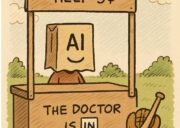Reflecting on Change and Motivation
Periodically, I take the time to reflect on what I have accomplished, to critically examine whether my behavior has been correct, and to consider how I could have improved in certain aspects.
It is common for all of us to make mistakes, to underestimate or overestimate a situation. Revisiting these situations with a critical mindset helps to find answers that often don’t emerge when we are in the midst of the situation.
We ourselves change over time, and with us, our priorities, our goals, and our values change.
Today’s analysis is dedicated to a series of events that occurred at the end of 2023, which made me reflect on how difficult it is to get people to change, even in the presence of an attractive proposal, or at least one that I considered as such.
The Challenge of Finding Replacements
From time to time, I have to integrate my development team with new figures, both to replace those who have left the company and to expand the team for new projects.
Leaving a company is a normal practice that, as I have already described, every manager should take into account, but is often underestimated.
To quote Jane Austen:
“No one is ever too old to change, for change is the only constant in life.”
We should not be alarmed if one of our collaborators decides to change, but we must be ready to manage the change, sometimes in a sudden way.
The reasons for “leaving” are manifold. In my case, they were programmers who had left the company to go to other realities, retirements (yes, it happens, it’s not a mirage), and relocations: it is wrong to force a programmer to remain on a project that he does not feel is his own. Either we manage to motivate him, or it is better to move him to another project with different stimuli, in order not to damage him and, as a result, the group in which he is inserted.
This time I had to find a person to replace a programmer who was retiring: normal administration, managed well in advance, in order not to have any disruptions and to be able to manage the handover process effectively.
The Unexpected Problem
The problem arose during the selection phase of the new programmers who did not accept my offer. And no: the reason was not the salary, which was higher and in line with the candidates’ requests.
In the past, I thought that salary was the main reason for a programmer to change companies, influenced by the many times I read that it was the first thing people evaluated when deciding to change jobs, but I had to change my mind.
I placed too much emphasis on salary, likely because it’s one of the few objective metrics available and is often the primary focus in programming communities. In most forums, salary is the most discussed and frequently prioritized factor when considering career changes.
Let’s step back and see the kind of need I had to satisfy.
The search was aimed at an experienced Java programmer interested in joining our development team for a backend product used at the European level.
Focusing the request immediately is, I think, a fundamental aspect when approaching a candidate for the first time: it saves time for both parties and avoids unnecessary waste of time.
Many programmers hate working on projects they don’t know, don’t understand, and don’t find stimulating. By talking immediately about the project and the visibility it allows, you make the candidate understand how important and visible their work will be.
The second aspect I address is the technological one.
Working with technologies considered “obsolete” or “old” is a deterrent for many programmers.
“I don’t want to work on Java, it’s an old language, I’m not interested” is a sentence I’ve heard many times. As well as often hearing:
“What version of the Java language do you use? Version 8? No thanks, I’m not interested.”
Even if the language or the technologies used are not a problem, a recent version of the language or technologies they don’t know is an incentive for many programmers.
Similarly, making it clear that the project is constantly evolving and that we are trying to bring the product to a more recent version of the language is a further incentive, as long as it is not disappointing.
In my case, the project began in Java 11 and was later migrated to Java 17, utilizing a variety of libraries and frameworks along the way.
What I aimed to emphasize was that the project is continually evolving, and the candidate’s contributions would play a key role in its success.
The third aspect I address is that of the salary.
Knowing that it is an important aspect, I already indicate the salary I can offer at the first interview, in order not to create false expectations: it is an advantage for everyone. The candidate already knows what they can aspire to, and I know whether the candidate is interested or not.
By immediately focusing on the project, objectives, and compensation, the candidate already has a complete picture of the situation and can decide whether to continue the selection process or not.
A bit for the sake of clarity, a bit for the demonstration that the technology stack was up-to-date, a bit for having exposed the salary from the outset, I received an adequate number of applications and, after a selection phase, I identified some promising candidates.
They were good for me, they were good for the team, they were good for the managers, and, above all, all the candidate’s requests were met: working in a known field, using recent technologies, and having a higher salary.
When a Higher Salary Isn’t Enough
Despite the premises that encouraged me to think that everything could be resolved positively, I received negative responses that I did not expect:
“I don’t feel up to it.”
The main reason some candidates declined our offer was that they didn’t feel ready for the transition. While their current jobs may be less stimulating, less engaging, and lower-paying, they still offer stability and familiarity.
The change, even for the better, was perceived as a risk, a leap into the void.
This made me think about the fact that, even if you find yourself in a company that does not satisfy you and you can have all the reasons to change if you are not inclined to change, you will not change, or at least you will not do so for a minimum change. Stronger motivations or a dialogue capable of making the change perceived not as a moment of stress, but as a moment of growth and enhancement, are needed.
I have noticed this phenomenon, especially among the more mature figures, who prefer to remain in known contexts rather than face a change, even if beneficial.
The “comfort zone,” even if problematic, can make us accept toxic situations as normal.
“The greatest obstacle to change is not ignorance or resistance, but the illusion that what we do now is safe.”
This also made me think about all the times someone has confessed to me that they are dissatisfied with their job, but do not want to change for fear of not finding something better.
“The fear of change is a common feeling, but it can be overcome with the right strategies.”
Based on what I have observed, some strategies that can help overcome the fear of change are:
Small Steps: For those who do not like “brutal” change, the small steps technique can help. Do you feel that what you are doing does not satisfy you? Start studying what you would like to do. Devote time to it every day, and you will see that over time you will have enough knowledge to make the leap you so desired.
Growth Mindset: Do not look at challenges with fear, but as opportunities to grow and evolve your situation. Having a growth-oriented mindset allows you to almost transparently exit your mental cage.
Visualization: Do not look at change with negativity, but try to bring your mind beyond and think about what could happen positively once the change has occurred.
Social Support: Seeking the support of colleagues, friends, or mentors helps to better understand what can happen and can provide the encouragement needed to overcome the mental obstacle that prevents change.
The Mistakes I Made
It’s easy to blame the candidates if someone decides not to accept your offer. Addressing the issue intelligently should instead make us ask the question: where did I go wrong?
If we are unable to understand what did not work, we will not be able to improve.
In my case, I tried to look for the answer beyond the salary, beyond the project, beyond the technologies used.
And what if behind that “I don’t feel up to it” there was actually a “that’s not exactly what I’m looking for”?
I tried to understand what could have pushed a programmer not to accept a proposal that seemed attractive.
One of the reasons I gave myself was certainly the corporate context in which the candidate would have had to work, or at least the way I had portrayed it during the interview.
Someone talks about “corporate appeal,” that is, the attractiveness that a company has towards a candidate.
Corporate appeal is a set of factors ranging from the work style to the corporate culture, from the benefits offered to the possibility of growth, from the training opportunities to the possibility of working in a stimulating environment.
Corporate appeal is an important factor that is often underestimated but can make the difference between a candidate who accepts the offer and one who rejects it.
Showing that your company has values, believes in people’s development, offers the possibility to grow and train, offers a stimulating and comfortable work environment, can make the difference between a candidate who accepts the offer and one who rejects it.
Conclusion
Thinking that by just offering a higher salary you can motivate a change is a mistake I have made throughout my life.
I have not brought on board people who could have made a difference for my team and my project.
This has taught me that the greatest work that every manager should do is to make their company attractive to candidates, to make them perceive that working in that company is an opportunity for growth and enhancement.
Make the candidate perceive that they will be able to work independently, with the right tools, that they will grow year after year and will be an important piece for the company’s success.
At that point, many aspects that were previously considered fundamental become secondary.
The salary, the project, the technologies used become just a detail, a secondary aspect compared to the corporate appeal and the growth opportunities that the company offers.




